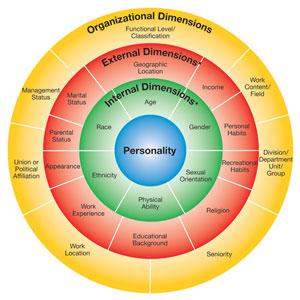
Say the word “diversity” and others will probably think immediately of the adjective “racial” as a preceding adjective. “Diversity,” of course, is a word with many, many definitions. Yes, the most common is racial diversity, but — especially in the workplace — diverse associations are equally common. The word could apply to the difference between people of different genders, different sexual orientations, different religions, different cultures, different economic background, different levels of education, different
work-classifications, and so on. “Diverse” is even a word that could apply to different thinking styles.
If we accept the definition of “diverse” as “different” or “showing a great deal of variety” and apply it to workplace teams, we can benefit considerably from the research conducted by American psychologist Robert Sternberg, who developed the Triarchic Model of Intelligence. It’s three elements are analytical intelligence, creative intelligence, and practical intelligence. So, let’s assume you are forming a team to accomplish a given task — at work, at home, with neighbors or fellow parishioners or PTA members. Keeping Sternberg in mind, you will have, ideally, at least one person who is logical; at least one who sees things from a different or unusual perspective; and one who is knowledgeable about the processes involved.
Paralleling Sternberg’s work is a recent article by Judy Chartrand, Ph. D. (“How Do YOU Think?” Training, January/February 2013, page 111). In it, Chartrand describes seven different thinking styles: Analytical, Inquisitive, Insightful, Open-Minded, Systematic, Timely, and Truth-seeking.
In terms of problem-solving, most experts agree there are two basic divisions — the convergent approach and the divergent approach. Convergent thinking is logical, predictable, analytical, and dependent upon the scientific method, which tests a hypothesis in order to learn what the actual problem is. The divergent approach is more creative, spontaneous, visual, and necessary for situations in which there is no precedent. (If you are what is known as “lateralized,” you are able to employ both approaches equally well.)
You can develop your skills in either or both arenas fairly easily.
To develop your convergent or analytical skills:
- Improve your ability to gauge time requirements.
- Learn more about finance.
- For two weeks, keep a log of the problems you solve each day and the method (if any) you use to solve them.
- Read a biography of an outstanding scientist to develop an appreciation for analysis.
- Clean off your desk and organize your files.
To develop your divergent or imaginative skills:
- Engage in “what if…” thinking.
- Take an art class or a music class.
- Whenever you can, imagine the possibilities surrounding a given object.
- Combine two unlikely possibilities and seek a solution in their union.
- Associate with creative people.
In terms of workplace productivity, it really doesn’t matter how many ways of thinking you endorse. What does matter is showing respect for the thinking styles of individuals who seek problem-solutions in a manner that differs from your own. When we go beyond tolerance to appreciation of different thinking styles, we move closer to the ideal outcomes.

Comments
Diversity and thinking Style
This article showed great insight on the way we think especially those from different cultures. I really like how you pointed out the fact that in a diverse workplace there can be more than one perspective. For example if i were to hire a team to do a project, the more diverse my team is , the more insightful ideas Ideas I would get due to the diversity of my team. You pointed out an interesting fact about the idea that each ethnicty provides different point of views about different subjects and I believe that it is important to understand and listen to each and every individual.